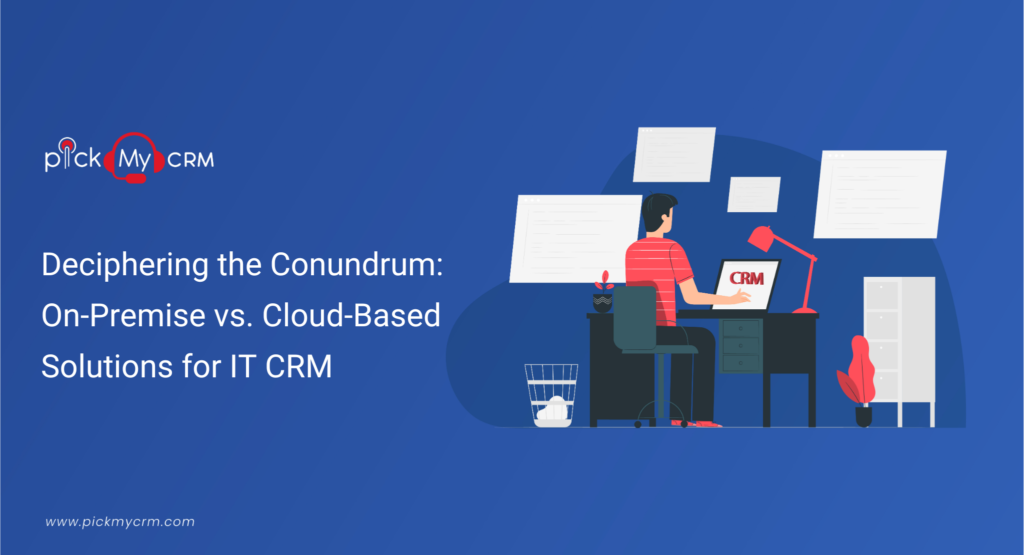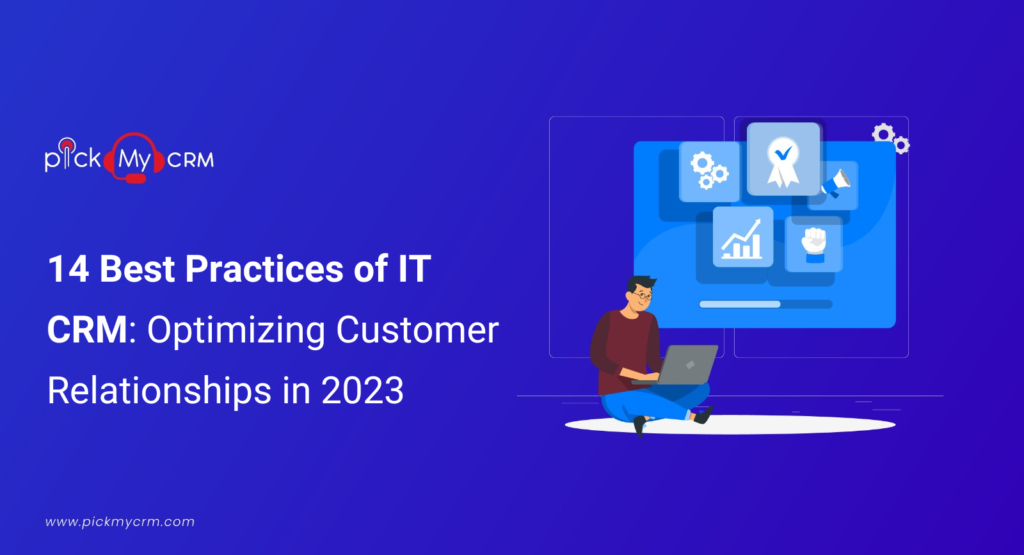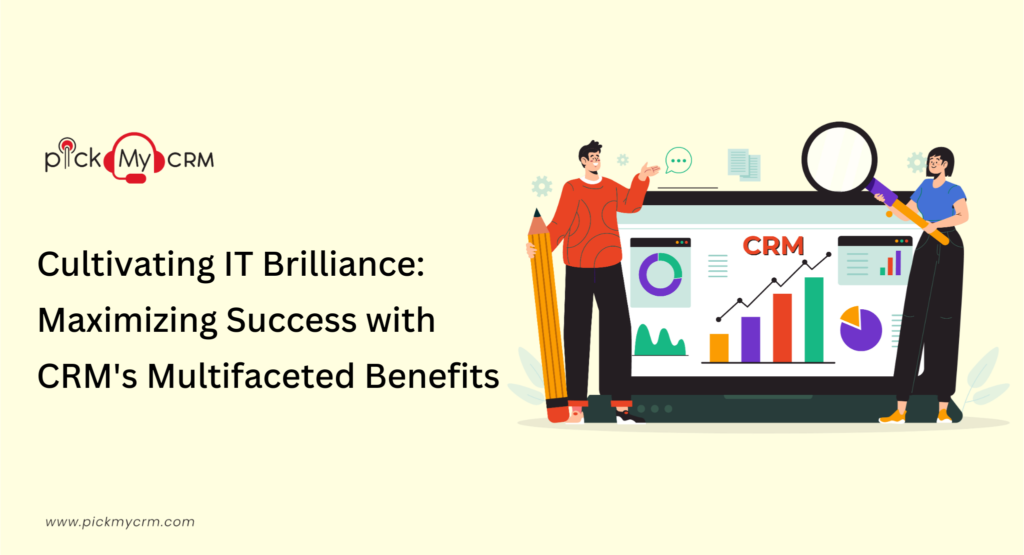Unveiling the Battle: On-Premise vs. Cloud-Based Solutions for IT CRM
Understanding On-Premise Solutions
On-premise CRM solutions involve hosting the software and data on your physical servers within your organization. This traditional approach offers a high level of control and customization, allowing you to shape the system according to your specific requirements. It also suits companies with strict data compliance and security regulations, as they retain complete control over their data.Advantages of On-Premise CRM
- Data Control: On-premise CRM solutions grant data control as the data resides within your network. This level of control is advantageous for organizations with strict data privacy and compliance requirements.
- Customization: These solutions offer high levels of customization. You can tailor the CRM system to align precisely with your business processes and unique needs, enhancing operational efficiency.
- Security: On-premise CRM systems allow you to implement and manage security measures. It is Beneficial for businesses dealing with highly sensitive or regulated data, ensuring data protection and compliance.
- No Ongoing Subscription Costs: Unlike cloud-based solutions that involve recurring subscription fees, on-premise CRM involves upfront costs but eliminates the need for continuous payments. Over time, this can lead to cost savings.
- High Performance: On-premise solutions often excel in performance due to their hosting within your infrastructure. It can lead to expedited data access and processing, Particularly crucial for businesses with intricate operations.
- Integration Control: You possess the ability to integrate your on-premise CRM with other in-house systems and software. This level of integration control can streamline workflows and data exchange.
- Predictable Upgrades: With on-premise CRM, you can schedule and manage software upgrades at your own pace, minimizing disruptions to your daily operations.
Challenges of On-Premise CRM
- High Initial Costs: On-premise CRM solutions typically require significant upfront investments in hardware, software licenses, and infrastructure setup, which can be a barrier for smaller businesses.
- Complex Implementation: Installing and configuring on-premise CRM systems can be a Complex and Time-consuming process, Often requiring specialized IT expertise.
- Maintenance Burden: On-premise CRM systems necessitate ongoing maintenance, including software updates, security patches, and hardware upkeep. It can Strain IT resources and budgets.
- Limited Mobility: Accessing on-premise CRM systems from remote locations or mobile devices can be challenging compared to cloud-based solutions, limiting workforce mobility.
- Scalability Challenges: Scaling up an on-premise CRM system to accommodate growth can be cumbersome and may require additional hardware investments, leading to higher costs.
- Data Security Responsibility: While on-premise CRM Provides control over data security, it also places the responsibility entirely on the organization. Any lapses in security can have serious consequences.
- Backups and Disaster Recovery: Organizations must manage their data backups and disaster recovery plans, adding complexity and potential risks.
- Limited Updates: On-premise CRM systems may receive updates less frequently than cloud-based counterparts, potentially leading to software lag in features and security.
Embracing Cloud-Based Solutions
Cloud-based CRM Solutions provide a virtual environment where the software and data reside on remote servers managed by third-party providers. This approach offers unparalleled flexibility and accessibility, especially in today's remote work landscape. It's particularly suited for businesses seeking rapid deployment and seamless scalability.Advantages of Cloud-Based CRM
- Cost Efficiency: Cloud-based CRM solutions typically involve lower upfront costs, as they are subscription-based. This cost structure is more manageable for businesses, especially smaller ones.
- Accessibility and Mobility: Users can access cloud-based CRM systems from anywhere with an internet connection, facilitating remote work and improving accessibility for field sales teams.
- Automatic Updates: Cloud CRM providers often handle software updates and maintenance, ensuring the system is always up-to-date and secure without requiring internal IT resources.
- Scalability: Cloud-based CRM systems are highly scalable, allowing businesses to add or reduce users and resources as needed, making them ideal for growing organizations.
- Rapid Implementation: Cloud CRM solutions are known for their rapid deployment, reducing downtime, and enabling businesses to reap the benefits.
- Reduced IT Overhead: Because the provider handles maintenance and updates, organizations can streamline their IT infrastructure and staffing, potentially leading to cost savings.
- Integration Capabilities: Cloud-based CRM systems often offer a wide range of Integrations with other cloud-based tools and services, simplifying workflows and enhancing productivity.
- Backup and Disaster Recovery: Cloud providers generally employ robust backup and disaster recovery systems, minimizing the potential for data loss and downtime.
Challenges of Cloud-Based CRM
- Data Security Concerns: Storing sensitive customer data in the cloud raises security concerns, as it relies on the cloud provider's security measures. Data breaches can have serious consequences.
- Dependence on Internet Connectivity: Cloud-based CRM systems necessitate a dependable Internet connection. Downtime or slow connectivity can disrupt access and productivity.
- Subscription Costs: While cloud solutions have lower upfront costs, ongoing subscription fees can accumulate over time, potentially exceeding the cost of an on-premise solution in the long run.
- Limited Customization: Cloud CRM systems may provide Limited customization compared to on-premise solutions, which can restrict their capacity to align precisely with unique business processes.
- Data Ownership and Portability: Organizations may face challenges in migrating data away from a cloud provider or maintaining control over their data if they decide to switch Providers or bring services in-house.
- Vendor Lock-In: Organizations can become dependent on a specific cloud provider's ecosystem, making it difficult to transition to a different provider or return to on-premise solutions.
- Compliance and Regulatory Issues: Some industries have strict compliance requirements that may be challenging to meet in a cloud-based environment, necessitating careful consideration of regulatory concerns.
- Integration Complexities: While cloud CRM systems offer integration capabilities, complex integrations with legacy systems or on-premise software can be challenging and costly.
IT CRM: On-Premise vs. Cloud-Based CRM Solutions
Deployment: The Crucial First Step
On-Premise: Deploying an on-premise CRM requires substantial upfront investments in hardware, software licenses, and IT expertise. The setup process can be time-consuming, involving hardware procurement, software installation, and system configuration. Cloud-Based: Cloud-based CRM solutions offer rapid deployment without the necessity for substantial hardware investments. Quick initiation with minimal setup is possible, as the software is accessed through the Internet and managed by the provider.Cost Considerations: Balancing Budgets and Resources
On-Premise: On-premise deployment carries higher upfront costs due to hardware acquisition, software licenses, and infrastructure setup. This capital-intensive model is suitable for companies with well-established IT departments and substantial budgets capable of managing the financial burden associated with these initial investments. Cloud-Based: In contrast, cloud-based deployment operates on a subscription-based model. It eliminates the need for substantial upfront investments, making it particularly advantageous for businesses with limited budgets. The subscription structure allows for better resource allocation and financial planning, ensuring that smaller enterprises can access sophisticated CRM capabilities without the strain of high initial costs.Customization: Tailoring to Unique Needs
On-Premise: Organizations aiming for intricate customization that perfectly aligns with their distinct business processes gain an advantage through on-premise deployment. With complete control over the infrastructure, you can tailor the CRM system to fit intricate workflows and specific requirements. Cloud-Based: Although cloud-based solutions offer customization, they might not address exceptionally specific or intricate needs as effectively as on-premise systems. Cloud solutions often prioritize a standardized approach to accommodate users.Scalability: Preparing for Growth
On-Premise: Scaling an on-premise solution can be a complex undertaking. As your business expands, the need for additional hardware and software licenses arises, potentially leading to resource constraints and logistical challenges. Cloud-Based: Cloud-based CRM solutions shine in scalability. Businesses can effortlessly scale up or down based on demand without the significant infrastructure investments that on-premise systems would require. This flexibility is particularly beneficial for companies experiencing growth or seasonal fluctuations in customer interactions.Maintenance and Updates: Balancing Workloads
On-Premise: Maintenance responsibilities for on-premise solutions fall squarely on the organization's shoulders. It entails hardware maintenance, software updates, and security patches. Companies must allocate resources for IT management and support to ensure the seamless operation of the system. Cloud-Based: Cloud-based deployment lightens the maintenance load. Cloud providers take care of Routine maintenance, Updates, and automatic security patches. It relieves your internal IT team from these responsibilities, allowing them to focus on more strategic initiatives that drive business growth.Security and Compliance: Navigating Data Protection
On-Premise: On-premise solutions grant companies increased control over data security and compliance, a critical aspect for industries with stringent regulatory demands or organizations managing sensitive customer information. Cloud-Based: Cloud providers invest significantly in security measures, encryption protocols, and compliance certifications. Respected cloud providers prioritize data security, rendering them suitable for numerous industries. Yet, industries with sensitive data might prefer on-premise solutions to retain complete control.Accessibility: Bridging the Gap
On-Premise: Access to on-premise CRM systems is typically limited to the office premises. It can pose challenges for remote or distributed teams that require constant access to customer data and interaction history. Cloud-Based: Cloud solutions shine in the realm of accessibility. They offer seamless access from anywhere with an internet connection. It is particularly advantageous in the modern business landscape, where remote work is becoming increasingly prevalent.Downtime and Reliability: Minimizing Disruptions
On-Premise: On-premise systems can experience downtime due to hardware failures, maintenance activities, or unforeseen issues. Organizations need to have contingency plans in place to minimize disruptions in customer service and data access. Cloud-Based: Cloud providers often ensure high availability and redundancy in their services. It minimizes the risk of downtime due to hardware failures and technical glitches. However, it's worth noting that reliance on internet connectivity can still impact accessibility.Making the Decision: On-Premise and Cloud-Based
When comparing on-premise and cloud-based IT CRM solutions, there Isn't a one-size-fits-all answer. The decision ultimately hinges on your organization's needs, budget, and long-term goals. When deciding, take these factors into account,- Budget: Assess your financial resources and determine whether upfront costs or a subscription-based model aligns better with your budgetary constraints.
- Security: Assess the sensitivity of your data and the extent of control needed. On-premise solutions provide greater control, whereas cloud solutions may feature robust security measures.
- Customization: Consider the depth of customization needed for your CRM system. On-premise solutions may be better suited for highly tailored needs.
- Accessibility and Mobility: Reflect on the importance of mobility for your team. If remote access is crucial, cloud-based solutions provide a significant advantage.
- Scalability: Think about your growth trajectory. Cloud-based solutions are generally more adaptable to changing needs.




